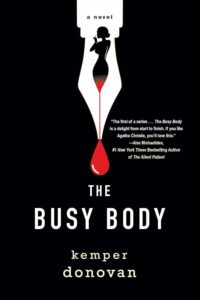 This yummy book is centered on a ghostwriter (never named) who gets a dream assignment: she’s to collaborate with Dorothy Gibson, a Hilary Clinton-esque figure who has just lost a presidential election and has retreated to her home in Maine. The ghostwriter informs the reader that meeting a subject has to involve some chemistry or it just won’t work, but she means to accept this assignment before she steps foot in the door, and the two women in fact hit it off.
This yummy book is centered on a ghostwriter (never named) who gets a dream assignment: she’s to collaborate with Dorothy Gibson, a Hilary Clinton-esque figure who has just lost a presidential election and has retreated to her home in Maine. The ghostwriter informs the reader that meeting a subject has to involve some chemistry or it just won’t work, but she means to accept this assignment before she steps foot in the door, and the two women in fact hit it off.
This is a plot driven book that’s governed by character. The author obviously has a love for golden age mysteries and makes frequent references to Poirot, Marple, and Inspector Alleyn, but it’s the budding friendship between the two women that powers the novel. As the ghostwriter accompanies Dorothy around town, Dorothy is frequently met by voters/fans who don’t quite know how to react but want to make sure she knows they voted for her. It’s poignant. The way Dorothy reacts is matter of fact and friendly, and you only see the cracks when she’s alone with the ghostwriter or her assistant. She also works nonstop, to the exhaustion of the writer, who cannot believe her energy.
While at the liquor store buying wine one night, they encounter a woman who talks Dorothy’s ear off and insists on a selfie. Dorothy is gracious but a bit annoyed. She thinks no more of it until the news of the woman’s suicide hits the local news. Dorothy and the ghostwriter decide to head to the funeral, held at the woman’s rental home, known as the “Crystal Palace” which apparently looks like an ice cube in the middle of the forest. It’s straight out of Knives Out.
As Dorothy and the ghostwriter work the party, the writer is begged by the widower’s assistant to ask Dorothy to speed up the medical examiner’s report. Dorothy indeed does and what emerges is that the woman’s death was not a suicide, but a murder. She also decides, to the intense annoyance of the local police – who have a bit of a problem trying to control the behavior of a former presidential candidate – to investigate.
The investigation itself is completely golden age, and while the clues are there, it’s an astute reader who will catch them all and solve the crime along with Dorothy. I loved Dorothy’s intelligence and the way she gets to the heart of things in her investigation. The ghostwriter is often a step or two behind. The social observations in this novel are funny, astute, well observed, and memorable, which is also very golden age. To me Agatha Christie was a great observer of social milieu and status with a humorous and cutting edge, and Donovan shares this quality with her.
This book was a full on reading love fest as far as this reader was concerned, with a slight caveat when it came to the ending. I wasn’t sure about the writer’s ultimate choice at the end of the novel. This is the work of a witty and intelligent writer, however, and I can’t recommend it more highly. — Robin Agnew